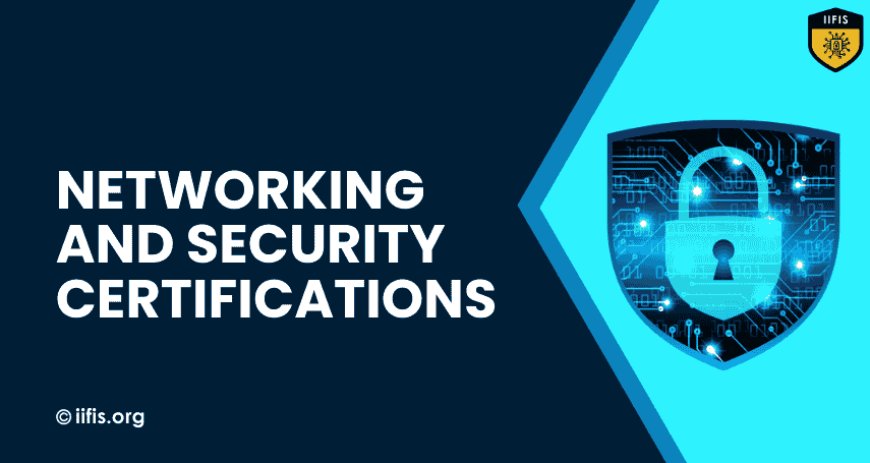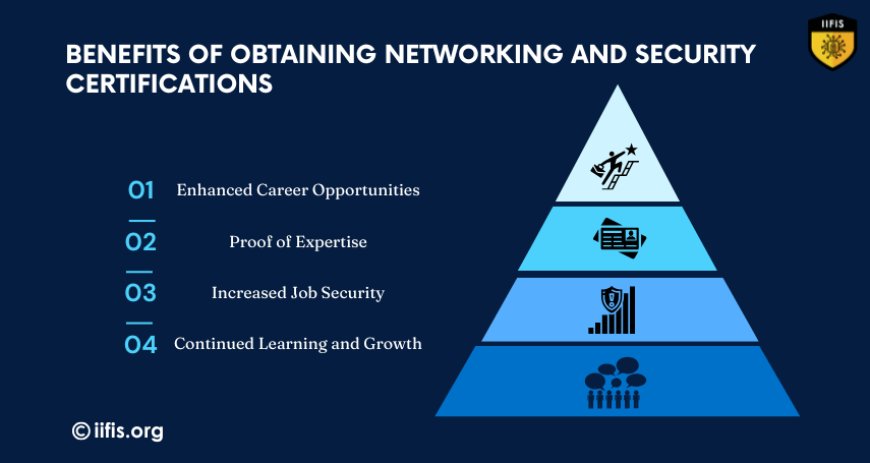Networking and Security Certifications Explained
Explore essential networking and security certifications that validate your skills and enhance your career prospects in the tech industry.

In an increasingly digital world, the importance of robust networking and security cannot be overstated. As organizations become more reliant on technology, the demand for professionals with the right skills and certifications continues to rise. Networking and security certifications are essential credentials that validate an individual's expertise in managing and securing network infrastructures. From foundational certifications like CompTIA Network+ to advanced options such as Certified Information Systems Security Professional (CISSP), these qualifications provide the knowledge needed to tackle today’s cybersecurity challenges. In this blog, we will explore various networking and security certifications, their significance, and how they can enhance your career in the tech industry.
What Are Networking and Security Certifications?
Networking and security certifications are professional credentials that validate an individual’s knowledge and skills in managing networks and protecting digital information. These certifications are earned by passing exams that test proficiency in areas such as network setup, troubleshooting, security protocols, and data protection.
-
Networking certifications focus on managing and configuring computer networks, including local area networks (LANs), wide area networks (WANs), and wireless systems. They cover skills such as network design, installation, configuration, and maintenance.
-
Security certifications focus on safeguarding networks, data, and systems from cyber threats. They ensure individuals are trained to identify vulnerabilities, implement security measures, and respond to cyber incidents, ensuring the integrity and confidentiality of sensitive information.
The importance of networking and security certifications
Networking and security certifications are essential for proving the skills needed to manage and protect complex network systems. As businesses depend more on digital technologies, the demand for strong network management and cybersecurity grows. This is due to the increase in cyber threats and the need to protect sensitive information. Certifications like CompTIA Network+, Cisco Certified Network Associate (CCNA), and Certified Information Systems Security Professional (CISSP) help professionals stand out by boosting their credibility and opening doors to better job opportunities. By earning these certifications, individuals can position themselves as skilled experts ready to handle the challenges in networking and security.
Key Networking Certifications:
Certified Network Security Professional (CNSP)
The CNSP certification focuses on securing network infrastructures. It covers network security protocols, firewalls, VPNs, and risk management. It's ideal for roles like network security engineer and administrator, demonstrating advanced skills in safeguarding networks from cyber threats.
Certified Cloud Security Expert (CCSE)
CCSE certification specializes in securing cloud environments. It covers cloud infrastructure, data protection, identity management, and risk management. As cloud adoption increases, this certification is essential for roles like cloud security engineer and architect, ensuring data security in the cloud.
Essential Security Certifications
With the rise in cybercrime, businesses are placing increasing emphasis on cybersecurity. These certifications demonstrate expertise in safeguarding systems and information. Key security certifications include:
-
Certified Information Systems Security Professional (CISSP): This globally recognized certification is ideal for experienced professionals. It focuses on security policies, risk management, and overall cybersecurity strategies.
-
Certified Ethical Hacker (CEH): For those interested in ethical hacking and penetration testing, the CEH certification teaches how to identify vulnerabilities and secure systems before malicious hackers can exploit them.
-
CompTIA Security+: A foundational certification for those entering the security field, covering everything from network security to risk management and cryptography.
-
Certified Information Security Manager (CISM): Perfect for professionals in management roles, CISM focuses on overseeing security programs, managing risk, and developing incident response strategies.
-
Certified Cloud Security Professional (CCSP): As businesses move to the cloud, this certification has become crucial. It focuses on securing cloud-based data, applications, and systems.
Benefits of Obtaining Networking and Security Certifications
Obtaining a networking or security certification offers several key benefits:
-
Enhanced Career Opportunities: Certified professionals are in high demand, and these credentials can significantly boost your career prospects. Many organizations require certifications for IT roles, ensuring that you stand out in a competitive job market.
-
Proof of Expertise: Certifications act as tangible proof of your skills. Whether you’re working in network administration or cybersecurity, having certifications assures employers that you’re up-to-date with the latest technologies and best practices.
-
Increased Job Security: As cyber threats continue to evolve, companies need certified experts to safeguard their data. Professionals with the right certifications are more likely to have job security as businesses prioritize security.
-
Continued Learning and Growth: Most certifications require ongoing education, ensuring that you stay current with the latest developments in technology. Continuous learning allows you to grow your skill set and stay relevant in an ever-changing industry.

How to Choose the Right Certification
Choosing the right certification depends on several factors, including your career goals, level of experience, and the specific area of IT or cybersecurity you want to specialize in.
-
Assess Your Career Goals: Are you more interested in networking, or do you prefer focusing on cybersecurity? Determine your career path to guide your decision on which certification to pursue.
-
Consider Your Experience: If you're new to the field, starting with entry-level certifications like CompTIA Network+ or Security+ might be a good option. If you’re already an experienced IT professional, certifications like CISSP or CEH can help you advance.
-
Research Industry Demand: Look at the certifications that are most in demand in your region or industry. Some certifications may hold more weight depending on the employer or sector you’re targeting.
Recommendations Based on Different Career Paths
-
Networking Career Path
-
CompTIA Network+ provides foundational networking knowledge.
-
Certified Network Associate (CCNA): Highly recognized in the industry, focusing on Cisco technologies.
-
Networks Certifications: Ideal if you aim to work with Juniper hardware and software solutions.
-
-
If you are pursuing a career in networking, consider starting with:
-
Security Career Path
-
CompTIA Security+: A great starting point for understanding core security concepts.
-
Certified Information Systems Security Professional (CISSP): Ideal for advanced roles in security management and strategy.
-
Certified Ethical Hacker (CEH): Best suited for individuals interested in penetration testing and proactive security measures.
-
-
For those interested in cybersecurity, the following certifications are recommended:
By considering your career goals, current skill level, and industry demand, you can make an informed decision on which certification will best improve your professional journey in networking or security.
Networking and security certifications are important for anyone looking to advance in the tech field. They validate your skills and can lead to better job opportunities and higher salaries. As demand for qualified professionals grows, these certifications can help you stand out.
If you're interested in boosting your career, consider pursuing networking and security certifications. Institutions like IIFIS offer valuable training programs that can set you on the right path. Start your journey today and unlock new opportunities in the tech world!
























